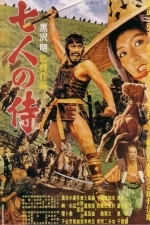"Here’s another one: Seven Samurai. The great Akira Kurosawa. He’s my favorite director and a lot of his films featured my favorite actor Toshiro Mifune. I never understood a single word he said, but the force and physicality of Mifune [was] just like a damn hurricane on a screen. In Seven Samurai, this epic film, there was a scene where Mifune’s character — he’s drunk — gets hit in the head. Someone whacks him with a stick and her just comes roaring into this scene like, “Who hit me?!” And he’s hilarious and crazy and you find out by doing some homework that guy never took any acting; he just walked into an audition and said, “You need an actor? I’ll act.” He was just this raw, crazily talented guy. I became fascinated by Kurosawa many years ago on a lot of levels — the way he would light scenes, the way he would shoot things, and the fact that he would use many of his actors over and over again. Obviously, Mifune repeats all throughout Kurosawa’s career, and also Takashi Shimura is in this film, and he stars in a beautiful Kurosawa film called Ikiru, which means “To Live.” It’s one of Kurosawa’s more melancholy introspective works. It’s just a beautiful film. Every time I’ve watched it it always moves me. And in Seven Samurai, there’s so much kinda cop-buddy film — you’re like, “Wow, that’s where they’re gonna get Lethal Weapon, Fistful of Dollars, Hang Em High.” I mean they’re just gonna get so many big movies from Kurosawa.
There’s a guy named Seiji Miyaguchi who’s the master swordsman in Seven Samurai, where he goes out on a mission just on his own and comes back holding some dead guy’s gun. A man with a sword takes out a guy with a gun. He just takes the gun, throws it on the ground, and I think he says, “Got two.” He just sits down and goes to sleep. This guy puts his face on his knees and goes to sleep like, “Been a rough night. Killed two guys. Oh, and here’s this gun thing. I don’t know how it works.” There are so many killer moments in Seven Samurai. Meanwhile it’s this sweeping epic [of] good versus evil. And the kind of neutral victory at the end where four of the seven samurai are dead; the farmers are just notably ungrateful for having had their assess saved by these seven selfless samurai. They’re basically rōnin — they are masterless samurai. And they go right back to their crops like, “Thanks, dude.” Really? You barely noticed what sacrifices were made, and you’re all cowards in the face of aggression. And these guys gave you everything and died doing it. There’s a lot of your own life that you could read into that. And I think Kurosawa did that magically from film to film, where he’d tap into human feelings quite often.
[Kurosawa] was just a master movie maker. Master writer. Master cameraman. The dude knew how to make a movie. And Seven Samurai is just a great example of it. It’s not my favorite Kurosawa film. I just think it’s such an amazing piece of work. It’s one of my favorite films just because it’s a massive undertaking. And in my top five I did not put in a Werner Herzog film, which I’m rethinking. I probably would have put in either Fitzcarraldo or Aguirre, the Wrath of God. And so, Herzog gets an honorable mention. But moving on."
Source

